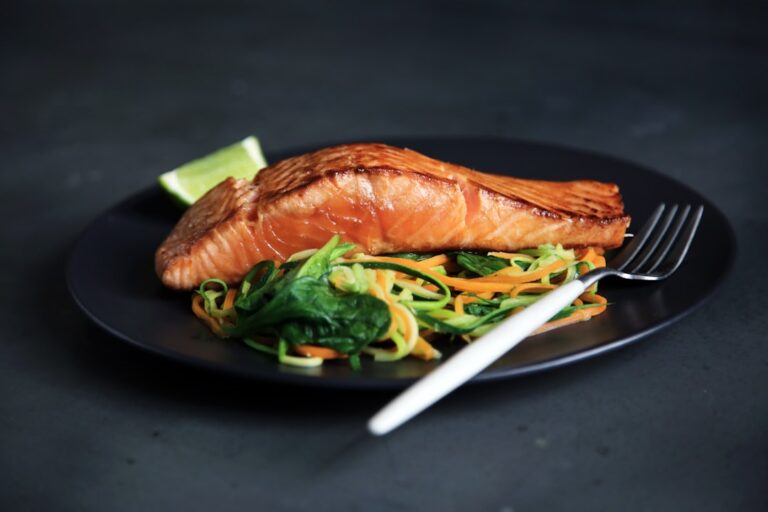Crafting a Healthy Diet Plan for Effective Weight Loss

Nutrition is the process of providing the body with the necessary nutrients to maintain health and well-being. These nutrients include carbohydrates, proteins, fats, vitamins, minerals, and water. Carbohydrates are the body’s main source of energy and can be found in foods such as bread, pasta, rice, and fruits. Proteins are essential for building and repairing tissues and can be found in foods such as meat, fish, eggs, and dairy products. Fats are also a source of energy and are important for absorbing certain vitamins and maintaining healthy skin and hair. They can be found in foods such as nuts, seeds, avocados, and oils.
Vitamins and minerals are essential for various bodily functions, such as immune system support, bone health, and energy production. They can be found in a variety of foods, including fruits, vegetables, whole grains, and lean proteins. Water is essential for hydration and helps regulate body temperature, aid in digestion, and transport nutrients throughout the body. Understanding the basics of nutrition is crucial for making informed decisions about food choices and maintaining a healthy lifestyle.
Key Takeaways
- Understanding the basics of nutrition is essential for making informed food choices and maintaining a healthy lifestyle.
- Setting realistic goals for weight loss is important to ensure sustainable and long-term success.
- Choosing nutrient-dense foods, such as fruits, vegetables, lean proteins, and whole grains, can help meet nutritional needs while managing weight.
- Balancing macronutrients, including carbohydrates, proteins, and fats, is crucial for optimal energy levels and overall health.
- Incorporating regular physical activity into daily routines is key for maintaining a healthy weight and promoting overall well-being.
- Monitoring portion sizes can help prevent overeating and support weight management efforts.
- Seeking professional guidance and support from a registered dietitian or nutritionist can provide personalized advice and accountability for reaching weight loss and nutrition goals.
Setting Realistic Goals for Weight Loss
When it comes to weight loss, setting realistic goals is key to success. It’s important to remember that weight loss is a gradual process and that sustainable results take time. Setting unrealistic goals can lead to frustration and disappointment, making it more difficult to stay motivated. Instead, focus on setting achievable goals that are specific, measurable, and realistic. For example, instead of aiming to lose 20 pounds in a month, aim to lose 1-2 pounds per week. This approach is more sustainable and allows for gradual progress.
In addition to setting realistic weight loss goals, it’s important to focus on overall health and well-being rather than just the number on the scale. This can include goals such as increasing physical activity, improving energy levels, and making healthier food choices. By setting holistic goals that encompass various aspects of health, you can create a more balanced and sustainable approach to weight loss.
Choosing Nutrient-Dense Foods
Nutrient-dense foods are those that provide a high amount of nutrients relative to their calorie content. These foods are rich in vitamins, minerals, and other essential nutrients that are important for overall health and well-being. Examples of nutrient-dense foods include fruits, vegetables, whole grains, lean proteins, and healthy fats. These foods provide a wide range of nutrients that are essential for various bodily functions, such as immune system support, energy production, and bone health.
When choosing nutrient-dense foods, it’s important to focus on variety and balance. This means including a wide range of fruits and vegetables in different colors, whole grains such as quinoa and brown rice, lean proteins such as chicken and fish, and healthy fats such as avocados and nuts. By incorporating a variety of nutrient-dense foods into your diet, you can ensure that you are getting a wide range of essential nutrients to support overall health and well-being.
Balancing Macronutrients for Optimal Energy
Macronutrients are the three main components of food that provide energy: carbohydrates, proteins, and fats. Balancing these macronutrients is important for maintaining optimal energy levels throughout the day. Carbohydrates are the body’s main source of energy and should make up a significant portion of your daily calorie intake. Focus on choosing complex carbohydrates such as whole grains, fruits, and vegetables, which provide sustained energy without causing rapid spikes in blood sugar levels.
Proteins are essential for building and repairing tissues and can also help regulate appetite and support muscle growth. Aim to include lean sources of protein such as chicken, fish, tofu, and legumes in your meals and snacks throughout the day. Fats are also important for energy production and should be included in moderation. Focus on choosing healthy fats such as avocados, nuts, seeds, and olive oil to support overall health and well-being.
Incorporating Regular Physical Activity
In addition to making healthy food choices, incorporating regular physical activity is essential for overall health and well-being. Physical activity has numerous benefits, including improved cardiovascular health, increased muscle strength and endurance, and enhanced mood and mental well-being. Aim to incorporate at least 150 minutes of moderate-intensity aerobic activity or 75 minutes of vigorous-intensity aerobic activity per week, along with muscle-strengthening activities on two or more days per week.
Incorporating regular physical activity doesn’t have to mean spending hours at the gym or engaging in intense workouts. It can include activities such as walking, cycling, swimming, dancing, or participating in sports or recreational activities. The key is to find activities that you enjoy and that fit into your lifestyle so that you can maintain a consistent routine. By making physical activity a regular part of your routine, you can support overall health and well-being while also supporting your weight loss goals.
Monitoring Portion Sizes

Monitoring portion sizes is an important aspect of maintaining a healthy diet and managing weight. Portion sizes have increased significantly over the years, leading to overconsumption of calories and contributing to weight gain. It’s important to be mindful of portion sizes and to practice portion control to ensure that you are not consuming more calories than your body needs. One way to monitor portion sizes is to use measuring cups or a food scale to measure out appropriate serving sizes of different foods.
Another helpful strategy is to use visual cues to estimate portion sizes. For example, a serving of meat should be about the size of a deck of cards, a serving of pasta or rice should be about the size of a tennis ball, and a serving of cheese should be about the size of four dice. By becoming more mindful of portion sizes and practicing portion control, you can better manage your calorie intake and support your weight loss goals.
Seeking Professional Guidance and Support
Seeking professional guidance and support can be incredibly beneficial when it comes to achieving weight loss goals. Registered dietitians or nutritionists can provide personalized guidance on making healthy food choices, balancing macronutrients, monitoring portion sizes, and creating sustainable meal plans. They can also offer support and accountability to help you stay on track with your goals.
In addition to seeking guidance from a nutrition professional, consider seeking support from a personal trainer or fitness coach to help you create a personalized exercise plan that aligns with your goals and lifestyle. They can provide guidance on proper exercise techniques, create effective workout routines, and offer motivation and support to help you stay consistent with your physical activity.
Overall, seeking professional guidance and support can provide valuable insight and accountability to help you achieve your weight loss goals in a safe and sustainable manner. By working with professionals who specialize in nutrition and fitness, you can gain the knowledge and support needed to make lasting changes to your lifestyle and achieve long-term success in reaching your weight loss goals.
In conclusion, understanding the basics of nutrition is crucial for making informed decisions about food choices and maintaining a healthy lifestyle. Setting realistic goals for weight loss is key to success and focusing on overall health and well-being rather than just the number on the scale can lead to more balanced results. Choosing nutrient-dense foods is important for providing essential nutrients that support overall health and well-being while balancing macronutrients for optimal energy is crucial for maintaining energy levels throughout the day. Incorporating regular physical activity is essential for overall health and well-being while monitoring portion sizes can help manage calorie intake. Seeking professional guidance and support can provide valuable insight and accountability to help achieve weight loss goals in a safe and sustainable manner.
Crafting a healthy diet plan for effective weight loss is essential for achieving your fitness goals. In a related article on LifeHacksFor, Angel Strawbridge shares her inspiring weight loss journey and the strategies she used to shed pounds and improve her overall health. Her story serves as a motivating example of how dedication and a well-crafted diet plan can lead to successful weight loss. Check out the article here for more insights and tips on achieving your weight loss goals.
FAQs
What is a healthy diet plan for effective weight loss?
A healthy diet plan for effective weight loss includes a balanced combination of nutrient-dense foods such as fruits, vegetables, lean proteins, whole grains, and healthy fats. It also involves portion control and regular physical activity.
How can I craft a healthy diet plan for weight loss?
To craft a healthy diet plan for weight loss, start by setting realistic goals, such as aiming to lose 1-2 pounds per week. Then, focus on incorporating a variety of nutrient-dense foods into your meals, controlling portion sizes, and staying hydrated. It’s also important to limit processed foods, sugary drinks, and high-calorie snacks.
What are some key components of a healthy diet plan for weight loss?
Key components of a healthy diet plan for weight loss include consuming a variety of fruits and vegetables, choosing lean proteins such as chicken, fish, and legumes, opting for whole grains over refined grains, and incorporating healthy fats like avocados, nuts, and olive oil.
How can I maintain a healthy diet plan for weight loss in the long term?
To maintain a healthy diet plan for weight loss in the long term, focus on making sustainable lifestyle changes rather than following short-term fad diets. This includes finding enjoyable forms of physical activity, practicing mindful eating, and seeking support from friends, family, or a healthcare professional. It’s also important to be flexible and allow for occasional indulgences while staying committed to overall healthy eating habits.





